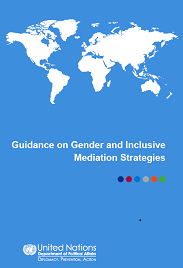Women’s Participation
Women have a fundamental right to participate in all political decision making, including peace processes at all levels. Including women in peace processes adds a broader range of perspectives and enhances the ability of peacemakers to address the concerns of a wider range of stakeholders, which has been proven to lead to more sustainable peace. Yet, women are often underrepresented or excluded from official peace processes. Therefore, mediators need to promote understanding among conflict parties of the value of the participation of women.
While acknowledging that it is the conflict parties that largely determine who, how and when different actors are brought into the process, mediators can nonetheless encourage conflict parties to include senior women in their delegations. Additionally, they can convene regular consultations with women representatives and groups and bring their concerns and priorities to the table. The UN Guidance on Gender and Inclusive Mediation Strategies provides mediation practitioners with practical tools for making their peacemaking efforts more inclusive and gender-responsive. It includes information and guidance on how to put into practice the gender dimensions of the international normative frameworks and how to introduce a gendered perspective in mediation preparedness and process design. It also addresses substantive issues in a peace process, including security arrangements, conflict-related sexual violence, political participation, powersharing and constitutions, as well as on drafting and the implementation of peace agreements.
COVID-19 and Conflict: Advancing Women's Meaningful Participation in Ceasefires and Peace Processes
Addresses the importance of women's full, equal and meaningful participation to an effective pandemic response and to peacemaking efforts.
Inclusion is Not Altruism. It’s Self-Interest and It’s Fundamental
Interview with Martin Griffiths, UN Special Envoy for Yemen
Factoring in Diversity: On the Need for Inclusive, Gender Sensitive and Multitrack Mediation
Interview with UN Special Representative to the African Union Hanna Tetteh
Helping Advance Women’s Political Rights in Ecuador
In partnership with UN Women Ecuador, DPPA backed efforts to address political violence against women, promoting the linkages between SDG 16 on peace, justice and strong institutions and SDG 5 on gender equality.
Women, Land and Conflict
Issues around land and conflict and why it’s important to protect women’s land rights for conflict prevention, mitigation and recovery, as explained by Ombretta Tempra, an expert on land and conflict with UN-Habitat based in Nairobi.
Palpable Momentum for Change: Towards Full Inclusion of Women in Search for Peace
UN DPA, DPKO and DFS mentorship event with women leaders working in special political missions and peacekeeping operations.
Women Mediator Networks
Women mediator networks aim to provide pools of experts who can contribute to inclusive peace processes.
Women, Peace and Security Agenda Comes into its Own
Inclusion for More Effective Peace Processes

March, 2017 | Author: United Nations DPA, now DPPA
This UN DPA, now DPPA, guidance seeks to inform mediators and their teams, as well as conflict parties, about the principles and strategies for the effective inclusion of women, as well as the introduction of a gendered perspective in mediation processes. The guidance addresses mediation preparation, inclusive process design, and substantive issues including security arrangements, participation, constitutions, as well as drafting and the implementation of peace agreements through a gender lens.
Women’s role essential for a global ceasefire
Explainer: What is “Women, Peace and Security”?
UN high-level seminar offers practical tools for senior mediators from CMI